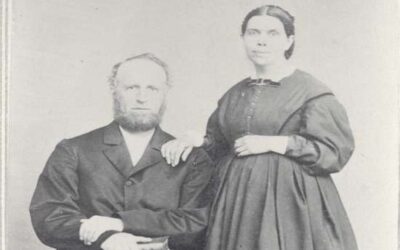Prayer is a simple act of faith with powerful life-changing effects. It’s talking to God and opening your heart to Him, just like you would open your heart to a friend.
This article will cover what the Bible says about various concepts of prayer.
Here are 4 things you’ll learn:
- The definition of prayer
- The importance of praying
- What can we pray for?
- That Jesus is lovingly waiting to hear your prayer
While prayer is something we might hear about frequently, have you ever wondered what it really is and how it works? Is it really just…talking to God?
You’re not the only one with these questions. In fact, Jesus’ own disciples asked Him to teach them how to pray. And He is just as willing to teach us today as He was willing to teach them then (Luke 11:1).
Let’s begin with the definition.
What is prayer?
Prayer is talking to God as your confidant. Through prayer, He can become your closest friend as Abraham “was called the friend of God” (James 2:23, NKJV).
This is what Hannah, Samuel’s mother, did when she was praying for a baby boy, and God answered her prayer (1 Samuel 1:9-13).
Prayer is for the Christian life what breath is to the physical life. And since we need God all the time, any time can be prayer time.
In the Bible, we find different forms of prayer.
Some were rather formal, like the morning and evening prayers of intercession at the temple.
But many of them were very personal prayers, like the ones you might say while feeding your baby or going through email updates at work. Prayer can happen anywhere, anyhow, alone, or with a group.
And for all of them, you can be sure that God hears—no matter who you are, or where you are in your spiritual journey.

Photo by Jack Sharp on Unsplash
We find an example of one who so valued this connection with God in Enoch, who “walked with God: and he was not, for God took him away” (Genesis 5:24, NKJV).
This doesn’t mean that he literally “walked” with God. Rather, he kept in touch with Him everywhere he went and in everything he did.
Just like you’d do with your best friend. You’ll keep updating him on all your encounters: where you are, what you are doing, the people you meet, and also enjoy seeing their reactions and opinions on what you are sharing with them.
And on the other hand, you’ll love it if they too share their experiences with you.
It’s how close friendships are made, right?
That’s exactly how it should be in our relationship with God. We talk to Him about our everything, and He speaks to us through:
- His Word when we study the Bible
- Nature and all of God’s creation
- His providential guidance, offering divine foresight and intervention
- The counsel of other believers
- Impressions that He puts in our hearts as we pray to Him according to His Word
That kind of constant communion is what Paul meant when he said we should “pray without ceasing” (1 Thessalonians 5:17, ESV).
Another example of a man who made God His friend is Moses.
The Bible tells us that “the Lord spoke unto Moses face to face as a man speaks to his friend” (Exodus 33:11, NKJV).
God is always seeking to commune with us. To connect with each of us in the most personal and intimate way. A connection so strong, and closer than any human tie.
And the best news is that the privilege of having this kind of connection with Him is yours, too!
Now, let’s see the role of prayer in developing such a trusting relationship with God.
What is the importance of prayer?
Prayer opens communication with God. We human beings are born into a world that is ruled by the devil, who is described as “the god of this world” (2 Corinthians 4:4, NKJV).
The Bible tells us that we can do nothing without Divine help, since God is our creator and sustainer. And if we have no relationship with our Creator, we will live and die as Satan’s captives (John 15:5).
But God is all-powerful. Only He can defeat Satan. And through prayer, we can reach out to Him for help, and be empowered to confront the things that face us (Philippians 4:13).
We are involved in spiritual warfare “against spiritual wickedness in heavenly places.” But we are assured victory when we present all our requests to God (Ephesians 6:12; Ephesians 6:18, NKJV).

Photo by Samuel Martins on Unsplash
God is always waiting to grant our needs. Sometimes people go through difficulties trying to do everything on their own, not considering that they could be giving everything to God in prayer and asking for His guidance.
God wants and promises to help us, but He respects our free will and won’t force Himself on us or in our lives without our permission. By asking Him through prayer, we demonstrate that we want God involved in our lives. That we accept the privilege of being God’s people. And His promise to us is that we “ask and it shall be given” (Luke 11:9, NKJV).
He hears and answers our prayers. We don’t have to feel helpless about our problems when God is ready to listen and grant us divine assistance (Psalms 65:2).
The Bible tells us to “cast all [our] care upon Him; for He cares for [us].” He has promised to “supply all your need[s]” (1 Peter 5:7; Philippians 4:19, NKJV).
All heaven is waiting to hear us present our petition before God through prayer.
And the whole Trinity is always at work to ensure our prayers are heard and answered: as we pray to the Father, by the power of the Holy Spirit, and through the name of our Lord Jesus Christ (John 16:23; Romans 8:26).
That if we ask anything in the name of Jesus and according to God’s will, He will hear and do it (John 14:14; 1 John 5:14).
What should you pray for?
You can pray for anything you need. Your prayer can even be a stream of consciousness, telling God everything that’s on your mind.
There’s no wrong way to pray! If your words or thoughts are sincere and opened up to God, He will hear you.
The Lord does not limit us in what we can talk with Him about. He says we can ask Him anything (John 14:14).
You should pray for “whatever things [you] desire” even if it looks impossible, “for with God nothing is impossible” (Mark 11:24; Luke 1:37, NKJV).
Here are some examples of different types of prayers in the bible
- Prayer for healing, James 5:14
- Prayer for comfort, James 5:13
- Prayer for guidance, Exodus 33:15
- Prayer for thanksgiving, 1 Chronicles 16:8, 34; Psalms 9:1; 95:1-3; 100:4-5; 105:1; 136:1; Luke 17:17
- Prayer for repentance, Psalms 51, 32
- Prayer for prosperity, 1 Chronicles 4:10
- Prayer for enlightenment and understanding God’s Word, Daniel 10:12
- Prayer for wisdom, James 1:5
- Prayer for protection, Daniel 2:17,18
- Prayer of intercession for a loved one, Luke 22:32
- Supplication for daily needs, Matthew 6:11
All our needs—be they physical, emotional, spiritual or any other category are valid before God.
That’s why Hebrews 4:16 welcomes us to come boldly to God.
Jesus even asks us to come to Him as a child would to a parent, calling Him “Our Father.” That’s because we’re children of God, and He takes full responsibility for us.
Jesus Himself taught us to pray in what has become one of the most common prayers— the Lord’s prayer. He asked us to pray saying:
“Our Father in heaven,
Hallowed be Your name.
Your kingdom come.
Your will be done
On earth as it is in heaven.
Give us this day our daily bread.
And forgive us our debts
As we forgive our debtors.
And do not lead us into temptation.
But deliver us from the evil one.
For Yours is the kingdom and the power and the glory forever.
Amen” (Matthew 6:9-13, NKJV).
This is one of the two models of Christian prayer given to us in the New Testament of the Bible.
Jesus is a friend who sticks closer than a brother
As we’ve seen, it’s by praying that we commune with God. We pour out our deepest needs and desires to Him with the assurance that God answers prayer. And He will answer according to His will.
So, don’t keep struggling with your life’s burdens when God would gladly help you if you commit them to Him. He says:
“Come unto Me all you that labor and are heavy laden and I will give you rest” (Matthew 11:28, NKJV).
All heaven is eagerly waiting to hear your simple and sincere prayers. God wants to commune with you. And we are assured that “whoever shall come unto Him shall in no wise be cast out” (John 6:37, NKJV).
Have faith that God hears all prayers and answers them all according to His will. Miracles still happen even today in answer to prayer. And He is waiting to hear yours, too.
He is “a friend who sticks closer than a brother.” Also, “He is very compassionate, and of tender mercy” (Proverbs 18:24; James 5:11, NKJV).
There are many resources you can use to enrich your devotional and prayer life. Resources like:
- Prayer journals
- Prayer groups you can join
- Books you can read
- Online resources like videos, audio sermons, or music on prayer.
Just as building a friendship with people is a process, building a friendship with God is a process too.
God is inviting you to begin it even today by saying a prayer. Then as you progress each day, step by step, you will see that as you continually draw closer to Him, you become more attuned to His presence in your life and feel His closeness to you (James 4:8).
And if you’d like to have someone to pray for you or with you, we at Ask An Adventist Friend are more than happy to do just that.
So go ahead and share your prayer request with us by filling out the prayer request form below.
Choose an Online Bible Study
Want to keep learning? Find out more about Jesus, humanity, the plan of salvation, and how God loves you enough to sacrifice everything, just to give you a chance to choose Him.
Sometimes it can be hard to know where to start, that’s why we offer free, user-friendly, online Bible study options you can do anytime, anywhere, and at your own pace.
This online Bible school will take you through the major themes of Scripture, breaking down the Bible’s complex concepts into bite-sized pieces, which can lead you toward the answers of life’s more challenging questions.
Related Articles
More Answers
Is the Seventh-day Adventist Church Protestant?
With so many Christian denominations, it can be hard to keep track of which ones share which beliefs. Let’s look at the core Protestant beliefs of Adventism.
The True Events Surrounding the Birth of Jesus
Jesus’ birth involved many strange events: a pregnant virgin, a stable birth, angels appearing to shepherds, and wealthy visitors. These help us understand His supernatural yet incredibly humble life.
Are Seventh-day Adventists Evangelicals?
According to its origins and definition, evangelicalism is about following Jesus and the Bible and sharing the Gospel through the way we live our lives. Adventists wholeheartedly harmonize with these principles.
Could Anything Keep Me from Becoming an Adventist?
We are each saved through Christ. But when it comes to church membership, are there certain beliefs or expectations to become an Adventist?
Do Seventh-day Adventists Have “Rules”?
We uphold principles we believe will help us maintain a closer relationship with Jesus and His Word. Learn how these principles guide Adventist lifestyles.
Your Comprehensive List of Ellen G. White’s Visions
Ellen White—an author, health-reform advocate, Bible scholar, and one of the most influential founding figures of the Seventh-day Adventist Church—was blessed by the Holy Spirit with the spiritual gift of prophecy (1 Corinthians 14; Romans 12:6-8). During her lifetime, she received direct guidance and inspiration from God in several different ways.
Do Seventh-day Adventists Have “Rules” For Marriage?
Around the world, many cultures and religions have various marriage traditions, expectations, or even rules when it comes to choosing a partner, planning the wedding, extended family logistics, or a number of other things.
An In-Depth List of the Prophecies About Jesus
How many prophecies of Jesus are in the Old Testament?
Can a Seventh-day Adventist Marry a Non-Adventist?
Yes. Seventh-day Adventists are not under any official rules that dictate who they can or cannot marry. This is a personal, life-altering decision between the couple and God.
What Adventists Believe About Alcohol and Tobacco Use
The Seventh-day Adventist Church has historically discouraged the use of alcohol and tobacco. Even before the church started in 1863, its leaders were realizing the negative effects of these substances.
What Does the Bible Say About Aliens and UFOs?
In 1938, aliens and UFOs were the subject of a mass prank. Around Halloween, Orson Welles performed a radio adaptation of H.G. Wells’ War of the Worlds. This ended up causing a panic throughout the United States—many people took it to mean that aliens had really attacked New Jersey.
What Do Adventists Believe About the Authority of the Bible?
Learn how one really old book (the Bible) is the sole foundation for all Seventh-day Adventist beliefs.
Is the Soul Immortal? Exploring What Adventists Believe
Based on the way the Bible describes humanity in comparison to God and angels, Seventh-day Adventists believe souls are not something you have, but something you are.
Jewelry—Why Do Many Seventh-day Adventists Choose Not to Wear It?
If you walk into a Seventh-day Adventist church service, you might notice that many people aren’t wearing earrings, bracelets, necklaces, or sometimes even wedding rings.
How the Bible Defines Love
Everyone talks about it, but do we really know what it means?
Why Does God Allow Suffering?
Poverty, genocide, a school shooting. A tsunami or earthquake that wipes out thousands of lives and leaves behind mourning family members.
International Pathfinder Camporee
Youth aged 10-15 in the Adventist Church’s global Pathfinder program look forward to the International Camporee every 5 years. This event brings together Pathfinders from around the world for exciting activities.
What Is Peter’s Ladder of Virtues, and How Does It Work?
Peter’s ladder of virtues is a phrase that refers to eight characteristics to be developed as a person grows in their relationship with Jesus Christ. It can be found in 2 Peter 1.
How Adventists interpret Bible prophecy
Bible prophecy conjures up a variety of emotions in people. For some, it feels exciting or mysterious.
What Counts as “Work” on the Sabbath?
God designed the Sabbath day to be a 24-hour period when we could pause and enjoy the goodness of His creation. We do this by putting aside our regular work so we can focus on spending time with Him and appreciating what He’s created (Exodus 20:8-11).
Moviegoers’ Guide to The Hopeful: The Facts Behind the Film
Learn where and when you can watch The Hopeful and how to get tickets. Already seen it? We’ll uncover the real story that inspired this film.
Protestant Reformation
Martin Luther. The 95 Theses. The Reformation. The Protest. Maybe you’ve heard these terms and wondered, What’s the big deal?
Ellen G. White’s Lasting Legacy
Ellen G. White is a well-known name among Seventh-day Adventists, but she also made an impact in many other parts of history, aside from being a co-founder of the Adventist Church.
Ellen G. White’s Challenging Health Journey
When it comes to lifelong struggles with health, Ellen White is no stranger. In fact, health challenges set the tone for her life early on—years before she was involved in co-founding the Seventh-day Adventist Church.
“What Was Ellen and James White’s Marriage Like?”
Ellen and James White, cofounders of the Seventh-day Adventist Church, met and married under somewhat unusual circumstances. But it’s a sweet story of partners in ministry becoming partners in life. And their married life continued to center on furthering the spread of the gospel together.
What Do Adventists Believe About the Mark of the Beast and 666?
It’s a popular topic, especially during tumultuous times. When everything around you feels chaotic, it’s easy to wonder about the end of the world, and topics like the mark of the beast, as mentioned in Revelation 13, can stir up uneasiness.
What is the Ellen G. White Estate?
What is the Ellen G. White Estate?Ellen G. White’s contributions to the formation and growth of the Seventh-day Adventist Church are an integral part of its history. As a significant co-founder of the denomination, her writings provided millions of people with...
Getting to Know Mark—Gospel Writer and Follower of Jesus
Mark (whose full name was John Mark) had a lot of roles in the New Testament: he was an early follower of Jesus Christ, he traveled the Mediterranean as a Christian missionary, and he wrote a book of the Bible.
Understanding Luke: The Beloved Physician, Historian, and Evangelist
Who was Luke in the Bible? What was he known for and what contributions did he make for the early church? Find out here.
Didn’t find your answer? Ask us!
We understand your concern of having questions but not knowing who to ask—we’ve felt it ourselves. When you’re ready to learn more about Adventists, send us a question! We know a thing or two about Adventists.


































